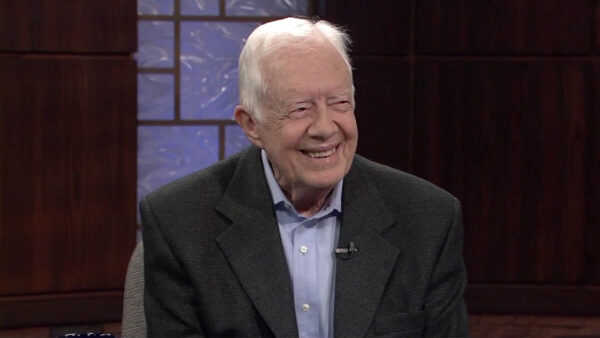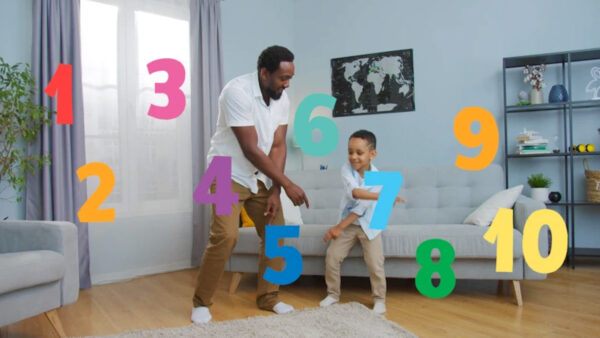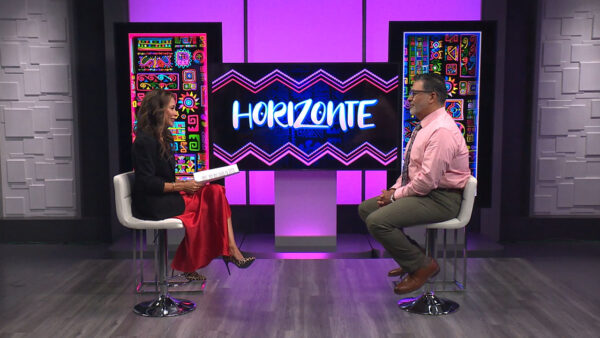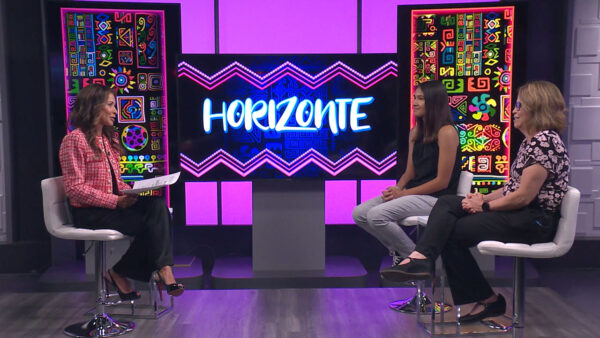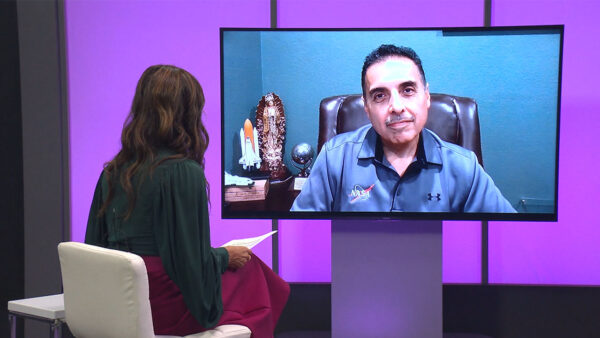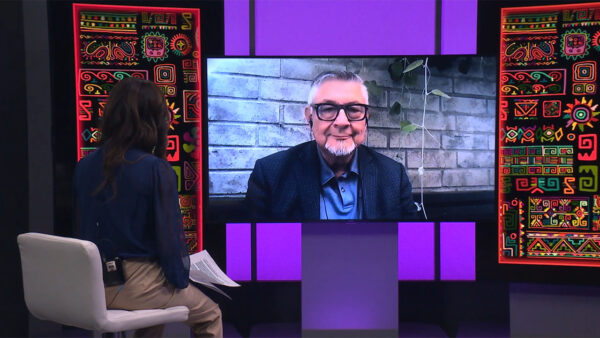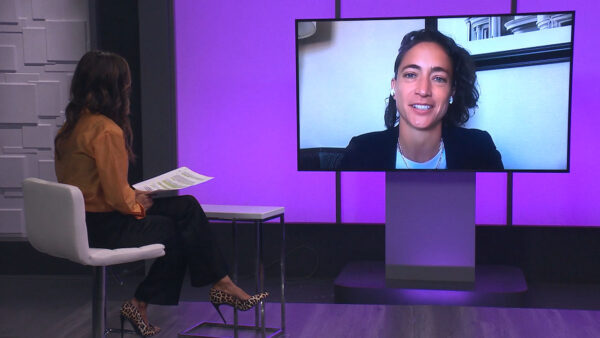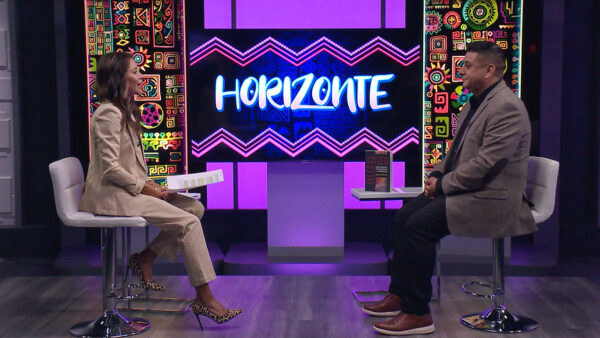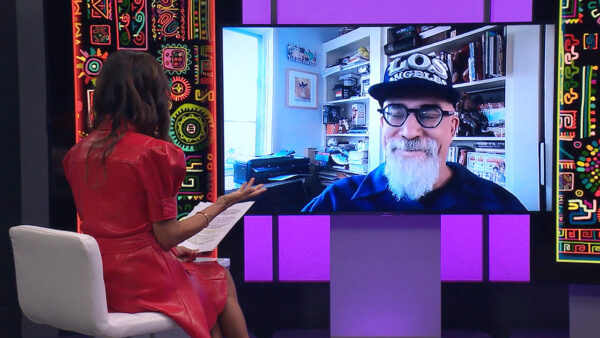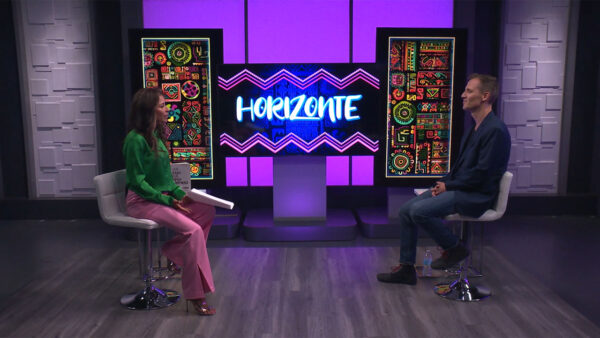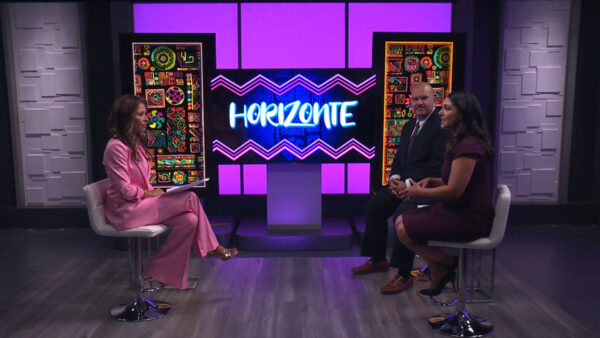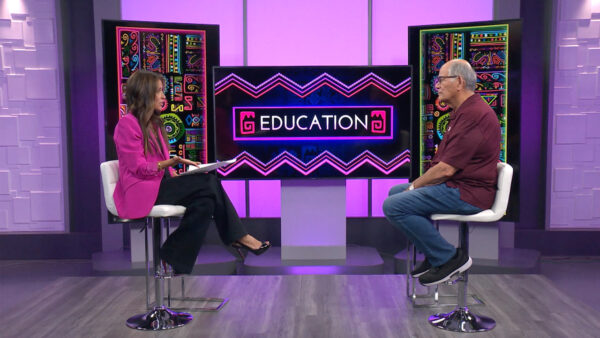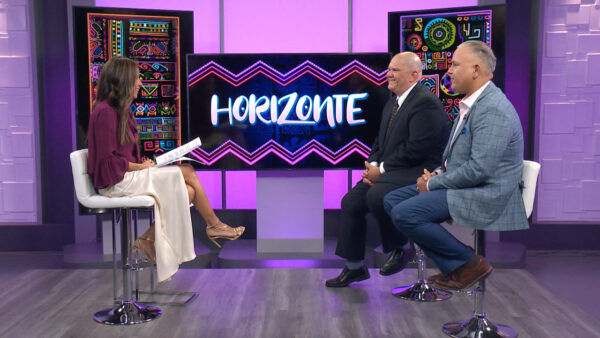Business and government leaders met during the Arizona-Mexico Commission Summit to talk about economic development between Mexico and Arizona. Luis Ramirez president of Ramirez Advisors Inter-National and Arizona-Mexico Commission advisor talks about the summit.
Richard Ruelas: Good evening, and welcome to "Horizonte." I'm Richard Ruelas, in tonight for José Cárdenas.
Richard Ruelas: Learn about a program giving high school students the opportunity to learn and earn a college scholarship.
Richard Ruelas: Business and government leaders come together to talk about economic development between Arizona and Mexico.
Richard Ruelas: And in "Sounds of Cultura (SOC)," an organization providing unique cultural programs in Arizona celebrates 20 years.
Richard Ruelas: All this coming up straight ahead on "Horizonte."
Video: "Horizonte" is made possible by contributions from the friends of Arizona PBS, members of your PBS station. Thank you.
Richard Ruelas: Good evening.
Richard Ruelas: It's a program where students can get help they need to raise their grades and possibly get a college scholarship all at the same time. It's called the learning lounge at Grand Canyon University, and joining me to talk about the program is Brian Mueller, president of Grand Canyon University. Thanks for joining us.
Brian Mueller: Good to be here, thank you.
Richard Ruelas: Learning lounge, tell me what it is. How you got the idea to start it.
Brian Mueller: It's interesting, we sit across the street on camelback from Alhambra high school, and about four years ago, the high school got a new principal, and I started out as a high school teacher, so I thought, I'd like to know what you're going to do, what are your plans? So we talked about high school for hours. He said we've got 2800 students, 82% are Latino, 90% live below the poverty line and there are 40 different languages spoken in my high school. We are a neighborhood of immigrants. And so I said, that sounds like a very difficult job. What are you going to do? And we talked a long time, and we came away -- what happens between 8:00 and 3:00 in an inner city high school is not much different than what happens between 8:00 and 3:00 at Chaparral high school in scale. But it all changes between 3:00 and 8:00. We live in a neighborhood of really hard working people. And frequently -- and it's a very family oriented neighborhood. Frequently there's nobody home when the kids get out of school. And they don't get the same kind of support. Many times --
Richard Ruelas: especially if their parents are immigrants themselves and maybe speak a different language at home, they might have a difficult time coupled with homework or some of the things that maybe are easier to handle in Scottsdale and Gilbert.
Brian Mueller: That's exactly right. They love their kids dearly and they have strong family units, but they haven't graduated from eighth grade, they don't understand algebra, so the kids don't get the help. So we decided to open this lounge. We don't call it a school, because kids don't want more school at 3:00, but we call it a lounge, and we hired our students at Grand Canyon to provide one-on-one free tutoring and mentoring to any student that wanted to walk across the street.
Richard Ruelas: Was the lounge already existing for GCU students?
Brian Mueller: No. We built it into a new building we were building. We gave them the nicest classroom space we have at the University. We wanted this to be something they really felt good about coming to. It started slow, because the kids didn't think they belonged on a college campus.
Richard Ruelas: So how do you get the word out even initially to the students, just going to the high school, that messaging has to be important to get the kids to think.
Brian Mueller: We used our students to make presentations in classrooms, make presentations in teachers' meetings. And it started slow, but it picked up really fast.
Richard Ruelas: What happens when a child goes -- when a high school student goes into the learning lounge?
Brian Mueller: Show an I.D., get checked in and you get assigned to one of our students. And we help you with whatever you want help with. Frequently it's math, a lot of times it's writing. Whatever it is, if you want to study for tomorrow's quiz or you want help writing a paper, whatever you want help with, we help you. Frequently the student will come back and want the same person. And so the thing really picked up steam. Now we're at a point where we've got a thousand of our students at Grand Canyon, they have to have a 3.5 GPA or higher who have been trained to provide one-on-one tutoring and mentoring to Alhambra high school students. They're coming across in the hundreds, and it is then phenomenal what's happened. Alhambra was a D-minus school, close to failing. Today they're nine points away from being a B school. Last year they were 417 graduates, to this year, 534 graduates. They almost doubled their pass rate on advanced placement examinations. And they really think they're going to be an A-rated school in a couple years. It's not magic. It's college junior sitting with a high school sophomore saying, you don't have to be a C student in algebra, we you can be an A student, if we spend six hours a week together, you can be an A student and think about going to college.
Richard Ruelas: We talk about programs like this on shows like this, some of it is just showing a student that a college campus isn't a foreign place. Getting them used to kicking the tires at a place like Grand Canyon University.
Brian Mueller: It's really a phenomenal thing that happens between our students and their students. They get to know each other, and it's around algebra to begin with, but we're just kids, I'm a couple years older than you are, I have a little more experience, but basically I'm like you. And so let's sit down, let's have fun doing it.
Richard Ruelas: How many years ago did this start?
Brian Mueller: A little over three years ago.
Richard Ruelas: So you probably haven't had many students who -- maybe you have, have students who have entered GCU through that program and may be helping current --
Brian Mueller: that's the next exciting step. I got very excited about this and I said, I'm not a fund-raiser, but people are going to get interested in this. So we did our first fund-raising event. We invited 100 companies to GCU before a basketball game and we made a presentation of the program. Where it's been, where it's going and where we thought it could go. And we asked for donations. We raised $350,000 the first night.
Richard Ruelas: Specifically for this program.
Brian Mueller: For this program, it's a scholarship program. We want to award 800 few-tuition scholarships to students in our neighborhood that get a 3.5 GPA or higher, spend 100 hours in the lounge, are recommended by a group of our team leads, our students who recommend them based on their character, work ethic and all that, so we raised $350,000, we matched it, and we awarded the first hundred scholarships a couple weeks ago to students in the neighborhood.
Richard Ruelas: And the program is expanded beyond the neighborhood, right?
Brian Mueller: Now it's -- we have -- we send students to Maryville high school, north high school sends students, Washington high school sends students, and Franklin school -- it's really growing. In fact, we've got people now moving into our neighborhood, they want their kids to go to the Alhambra so they'll have access to the learning lounge, free tutoring for four years and possibly be one of the 800 that gets a full tuition scholarship. So it's changing -- it's transforming a lot of things in our neighborhood it.
Richard Ruelas: seems like it's an easy formula. Obviously it is good for GCU and brings you students, and nice exposure, but it seems like it's an idea that can translate to places all around the city or the country.
Brian Mueller: It absolutely can. It's taking advantage, taking advantage is maybe not the right word, but of the immigrant mentality that's already -- always existed in America. We'll do, we'll work as hard as we need to get ahead. That translates to the students, and the students get an opportunity to get some help from somebody, and they get very excited about what they can do, what they can accomplish. The 800 kids that end up with the scholarships, all end -- all need to put a hundred hours back in to tutoring the next generation of kids. If you can imagine, 800 students, all owing 100 hours of tutoring to the next generation of kids, that's the pay it forward part. We made the initial investment, but after that initial investment is made, the program is self-sustaining.
Richard Ruelas: and a multiplier. In the closing minute, since we have you here, we should ask you if there's any change in the nonprofit status you were seeking and also there was some discussion of GCU moving locations because of a tax break. Any updates?
Brian Mueller: Not for profit thing didn't go the first thing, but it has a real chance of going again if we ever decide to go down that route. There's a real unique set of circumstances that would allow us to buy out our investors at a premium, which means we take on debt, but we would be able to pay that debt off with money we would be saving in tax savings. Grand Canyon is a very unique place in that it was going to close down. The only chance we had to keep it alive was going to the public market to get access to capital. We're so proud of how that's worked, but we have a standalone financial model. We don't need to go back for a second reoffering. We'll see how that goes going forward. We hope we have a chance to do that.
Richard Ruelas: And do you plan to stay in the neighborhood?
Brian Mueller: Oh, absolutely. We put $600 million into our campus in the last six years, which is more than we've made in advertised profits and we're going to put another 400 million in the next four years that. Will be a billion dollar investment, which is having a phenomenal impact on the neighborhood. Our housing values are up 30%, more than any in the state, and crime is down 30%.
Richard Ruelas: Obviously you've made an investment into the neighborhood students. Thanks for joining us, go learning lounge.
Brian Mueller: Thank you very much, good to be here.
Video: To find out more about "Horizonte," go to azpbs.org/horizonte. You can watch the most recent show, search the "Horizonte" video archives, or find out what's on "Horizonte" for the upcoming week. Dive deeper into issues you want to learn more about by visiting our special web sections, which cover the arts, education, immigrations, legislature, sustainability, and the "Sounds of Cultura." If you have story ideas or topics suggestions instantly submit them here. While you're there, show your support for "Horizonte" with one click. Visit azpbs.org/horizonte today.
Video: Watch sneak previews of what's coming soon. Go to www.azpbs.org/previews today.
Video: When you want to be more connected, friend us on Facebook, follow us on twitter. Watch us online.
Richard Ruelas: Last month, government and business leaders met during the Arizona-Mexico commission summit to talk about economic development between Mexico and Arizona. Joining me to talk about the summit is Luis Ramirez, president of Ramirez Advisors. Luis is also an advisor to the Arizona-Mexico commission. Thanks for joining us.
Luis Ramirez: Thank you for the invitation.
Richard Ruelas: Many of us weren't there. What did we miss? What happened?
Luis Ramirez: Many of us weren't there, but there was a lot of people there.
Richard Ruelas: Had we gone, what would we have been privy to?
Luis Ramirez: You know, I think probably one of the things that was more memorable from the event is the level of excitement. You truly saw close to 500 people, we even had people from outside the nearby states, but just a genuine excitement about the business opportunities that exist between Arizona and Mexico. And so many fields. I go back to the sense of excitement was palpable. Almost a full two-day event. We had a very high-level participation from Mexico and from the U.S. particularly in the private sector. So it was just a whirlwind. Nonstop from the moment it started until the time it ended.
Richard Ruelas: In the time that it's here, we saw some op-eds in the paper, speeches made about the opportunities that exist, but it seemed like if this summit was a chance to actually make those realities, bring businesses actually face to face.
Luis Ramirez: And that was -- the networking that took place in the hallways, that was a challenge getting people back in the meeting rooms.
Richard Ruelas: That was the poitn, right?
Luis Ramirez: That's exactly it.
Richard Ruelas: To get people to exchange business cards, not just be in a seminar about it but talk about, let's do some business.
Luis Ramirez: And then you have people from private sectors, small, large, corporate world, mayors from small cities to big cities. Of course the governors, both of SONORA -- we did have also the presence of three members of the Mexican cabinet, we had the secretary of agriculture, the secretary of tourism, and the secretary of foreign affairs that were participating throughout the event. So it was extremely high level participation. We also had a very diverse mix of additional speakers in various forms. One that drew a lot of attention by his title was the chief education evangelist from Google. And this is a gentleman who travels all over the world promoting how important education is on behalf of Google. So that was spectacular. We also had the inventor of a number of what we call almost daily things, this guy has invented a soccer ball that stores energy, and you play around with the soccer ball that stores energy and you plug in your phone and charge your phone. You charge your phone, tell the kids to go play soccer. There was that level of involvement from innovation, and technology development and business opportunities, from totally new concepts, all the way to the signing of a number of memorandums of cooperation between Arizona and SONORO, tremendous announcements about what's going to happen at the border, tremendous support from the Mexican government and of course our federal government as well on a number of issues. We're very excited about it.
Richard Ruelas: Politically was there some discussion of the -- the tone, or the this had taken place at a time as we have a discussion of building a wall between the two nations, Governor Brewer wasn't seen by Mexico's leaders as being much of a friend. I guess two parts, what has governor Ducey done differently or how did he handle this meeting, and was there some notion of trump's wall in the background?
Luis Ramirez: I think from the excitement that we saw during the event, I think the wall was almost a nonissue. There was business opportunities, relationships and the like. And I think in my hats off to the governor, governor Ducey, I should specify, he was actually -- when he took the delegation in June of last year to Mexico city, I think he took the message to the heart of the country to say, listen, Arizona is open for business. Let's not focus on the headlines, let's focus on what can we do together, whether it's business opportunities, promoting trade, promoting investment. And in fact, one of the accomplishments that was announced during the summit was the signing of an accord for cooperation between the Arizona department of transportation and its SONORAN counterpart. They're going to be collaborating on a study that builds upon a study that's going to be started between ADOT and the Mexican department of transportation, SONORA is coming forward with money to pay for the study, and it's not just roads and railroads, we're actually going to be look at identifying clusters for investment and job creation opportunities in the entire corridor for Mexico city to the Arizona border. So we're really taking that relationship beyond just -- I shouldn't say just SONORA, because it's so important, but we're really expanding to look at the opportunity that exists in the entire corridor.
Richard Ruelas: It sounds like you're building ties through not only governmental agreements, but business relationships that are going to strengthen the relationship between the two --
Luis Ramirez: absolutely.
Richard Ruelas: Headlines aside.
Luis Ramirez: Yes, and how we make our border more effective, more efficient and more -- make it easier for people to go across the border, in both directions, to do business and visit, and actually customs and border protection and the Mexican customs service made an announce. During the summit, we're very proud of, and we think is going to have a tremendous impact on the border in which the Mexican customs officials will actually be doing the inspection inside the U.S. federal inspection compound.
Richard Ruelas: Making it easier.
Luis Ramirez: One stop for both agencies to look at the truck, the truck is cleared and goes on.
Richard Ruelas: Excellent. Sounds like a very informative summit. I imagine there was fun but we'll discuss that in the after show. Thank you so much for the update.
Luis Ramirez: The Cultural Coalition started as a concept from a few people who got together to find a way to support and promote cultural events and local artists. 20 years later, that mission has not changed. It continues to bring people and arts together through community events, performances, and more. Joining me to talk about this is Carmen De Novais Guerrero, executive director for the Cultural Coalition. Who looks very festive this evening.
Richard Ruelas: Oh, thank you. Thank you so much.
Richard Ruelas: Take me back 20 years ago. What was the thought, how small was this group?
Carmen de Novais Guerrero: Very small. Maybe about four, five, six people. And we were just looking around at all the arts organization and how much they concentrate on the visual arts. There's not anybody who is concentrating on dance and theater and music. And that's what I want, I am a musician, and my husband is into theater. And we are all interested in how that part of art is reflected in our community.
Richard Ruelas: I guess there was always the Phoenix similar Monday I, ballet Arizona, but you're talking about smaller-scale or culturally --
Carmen de Novais Guerrero: culturally serving, the big organizations they don't really serve our community. They have a different --
Richard Ruelas: especially 20 years ago.
Carmen de Novais Guerrero: Yeah, 20 years ago, yes. Fine it will opera has some operas in Spanish now, but it's taken 20 years for them to get there. But anyway, so we wanted to continue performing and developing music and dance and theater. So that's when we came together to present theater, producing theater. I was a musician with a band, we did a lot of music, my son is a musician, and so -- and then we were talking about collaborations between musicians and dancers, and how we can create new dancers and new traditions.
Richard Ruelas: Was there an overall strategy of building this, or was it something that just happened as the years progressed?
Carmen de Novais Guerrero: Well, it was like, we had started CHICA NINO, which was primarily doing prints. So it became a small focus for the community. Nobody was doing dance and music and theater. So we felt we had a niche. So from the beginning we wanted to be a long lasting organization. And we are a virtual organization, we don't have a building. We use public spaces, we love to perform at the library, at schools, at parks. Because we really feel that's where the arts belong, in the public arena.
Richard Ruelas: And very public and -- a bit political too as we're looking at history, and these might spark memories from you. But very public displays of the art, right? What was the -- tell me about the processions.
Carmen de Novais Guerrero: We reenacted a tradition in Mexico for many hundreds of years. And the thing is when people moved here and we have a big influx of migrants, then we left our rituals back in our homeland. So doing it in a park, celebrating as a community, as an artistic venue for our community became our mission back then. And people loved it, because then it took the altars and the memories out of their homes into a park. So we have a community where people bring pictures of their beloved depart and they honor them. We made altars so Selena, to Cesar Chavez, to all our icons. So it became something we did as a community rather than privately in the privacy of our home.
Richard Ruelas: Dia de los muertos used to be something that was almost quiet, or --
Carmen de Novais Guerrero: a family event. Of course there's food, there's trips to the cemetery, there's cleaning of the graves, there's the flowers that people put in their graves and make everything so beautiful. And then here we live in an urban society, the 21st century, so we don't have the -- most people don't have the graves of their ancestors here. So anyway, that was a way to do it together as a community.
Richard Ruelas: And having the procession go through city streets, go through downtown.
Carmen de Novais Guerrero: Downtown. We did it before the light rail came. And we partnered with genesis academy, and one year specifically I remember we had pictures of it coming up, we did a whole dia de los muertos dedicated to campaign to vaccinate teenagers against pneumonia, against all of that, and making the connection between death and all these diseases.
Richard Ruelas: so you used the art as a way to speak to the community at large and the specific community.
Carmen de Novais Guerrero: To educate a specific community, and also to speak to the community at large. So we did marches against violence, march against burying our children, we should be burying -- the guns, for instance, we did one year -- the community was alarmed with all these things happening. So we tried to reflect and to involve the community in what we do as a festival.
Richard Ruelas: And I guess there has to be some part of you that is pleased that something like dia de los muertos, day of the dead has become so accepted, but also a little appropriated.
Carmen de Novais Guerrero: Well, that's the issue we have. We have commercialism. Themes. Last year Disney wanted to take over and copyright dia de los muertos, and there was a big uproar in all the community, in California, Los Angeles, here, all over the United States because you cannot appropriate culture. So anyway, we do have to make the festival authentic, we tried to use artists that practice, they're practitioners of dia de los muertos. Unless you understand how deep it is, philosophical meaning of the holiday, then it just becomes a Halloween thing. And we don't want to confuse the two things.
Richard Ruelas: It's not makeup, it's not dress-up.
Carmen de Novais Guerrero: No.
Richard Ruelas: Are they coming after Frida next?
Carmen de Novais Guerrero: I don't know, that's a good --
Richard Ruelas: tell me about FRIDA Kahlo.
Carmen de Novais Guerrero: Today is her birthday, she would have been 109 years old today. And we're going to be doing a part of a group of women artists, and this Saturday at the Heard Museum we're going to be celebrating her birthday. We're going to have bands --
Richard Ruelas: An all-female Mariachi.
Carmen de Novais Guerrero: Yes. And then we're going to have dancing, a look-alike -- it's not a contest, but the first 25 people that come dressed like FRIDA get a ticket and win a swag bag from us. And then we'll have raffles, and a beautiful birthday cake. So it's going to be a birthday party. And all of us, there's nine of us that will be there, we'll --
Richard Ruelas: everyone has a FRIDA last name.
Carmen de Novais Guerrero: Yes.
Richard Ruelas: It Sounds like a great event.
Carmen de Novais Guerrero: Thank you for having me.
Richard Ruelas: Happy anniversary.
Carmen de Novais Guerrero: Thank you.
Video: And thank you for watching from all of us here at "Horizonte" and your Arizona PBS station, I'm Richard Ruelas, in for José Cárdenas. Have you a great night. 13:30:52:10 Captioning Performed By LNS Captioning www.LNScaptioning.com
Video: "Horizonte" is made possible by contributions from the friends of Arizona PBS, members of your PBS station. Thank you. 13:31:36:04
Luis Ramirez: President of Ramirez Advisors Inter-National and Arizona-Mexico Commission Advisor
